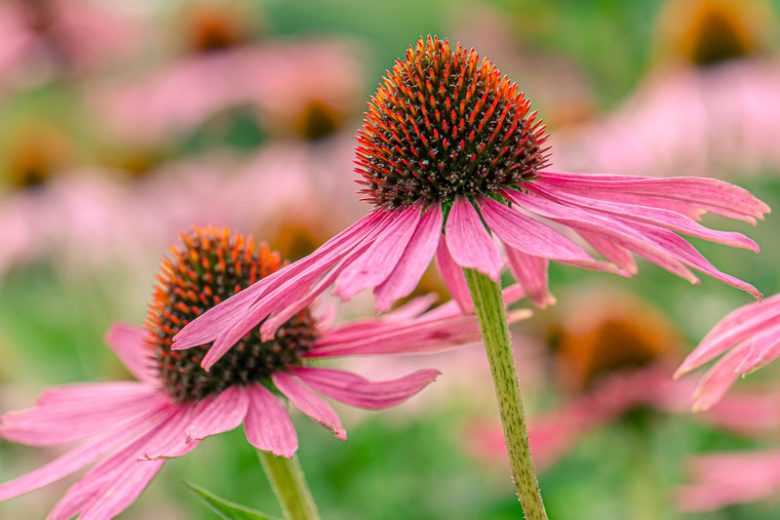Coneflower (Echinacea purpurea) for Immune Support

The coneflower (Echinacea purpurea) belongs to a group of flowering plants in the daisy family. These plants are native to North America, where they thrive in prairies and open wooded areas. The genus Echinacea includes several species, with Echinacea purpurea, Echinacea angustifolia, and Echinacea pallida being commonly used in herbal supplements
Immune System Support Properties of Echinacea purpurea
Echinacea purpurea, commonly known as purple coneflower, possesses several properties that contribute to its immune-enhancing effects:
- Immunostimulatory Compounds: Echinacea contains secondary metabolites such as alkamides, caffeic acid derivatives, polysaccharides, and glycoproteins. These compounds have immunostimulatory properties, meaning they help activate and modulate the immune system.
- Activation of Innate Immune Responses: Experimental studies have shown that Echinacea activates innate immune responses. It increases the activity of macrophages, enhances phagocytosis, and promotes cytokine production (including TNF-α, IL-1, and IFN-y). Additionally, it activates natural killer (NK) cells and stimulates T-cell proliferation.
- Enhanced Phagocytosis and White Blood Cell Counts: Human studies have confirmed similar effects, including improved phagocytosis and increased white blood cell counts. These effects enhance immunity by reducing response time and aiding in the direct clearance of pathogens. Overall, this lessens the severity of infections due to improved immune surveillance.
- Anti-Inflammatory Properties: Echinacea’s anti-inflammatory effects are primarily attributed to its polysaccharides. These properties make it useful for addressing various inflammatory conditions, including skin inflammation and inflammation caused by immune responses.
- Amelioration of Mucosal Immune Suppression: Echinacea has been shown to counteract mucosal immune suppression. It also inhibits several viral respiratory pathogens, fungi, bacteria, and parasites in experimental models

Other Health Benefits of The coneflower (Echinacea purpurea)
- High in Antioxidants: Echinacea is rich in antioxidants, including flavonoids, cichoric acid, and rosmarinic acid. These compounds help protect your cells from oxidative stress, which is linked to chronic diseases like diabetes and heart disease.
- Reduced Inflammation: The plant’s active compounds contribute to its anti-inflammatory effects. Echinacea may help alleviate inflammation associated with conditions such as arthritis and burns.
- Blood Sugar Regulation: Some studies suggest that echinacea may help regulate blood sugar levels. Although more research is needed, its potential impact on blood sugar management is promising.
- Pain Relief: Recent research indicates that Echinacea purpurea activates the endocannabinoid system, enhancing its pain-relieving effects. It has been studied for reducing inflammatory pain, including arthritis-related discomfort.
- Skin Health: Echinacea is used to treat various skin conditions. Its anti-inflammatory properties may benefit skin health and promote healing.
- Mental Well-Being: While not extensively studied, some people believe echinacea can positively impact mental health.
- Ear Infections: Echinacea may help prevent ear infections and reduce their recurrence
Some ways to use Echinacea effectively
- Dosage and Forms:
- Dry Powdered Extract: Take 300–500 mg of Echinacea purpurea three times daily.
- Liquid Extract Tinctures: Consume 2.5 milliliters (mL) three times daily, or up to 10 mL daily.
- General Immune System Support:
- During colds, flu, upper respiratory tract infections, or bladder infections, take echinacea 3 times a day until you feel better, but not for more than 10 days.
- Avoid taking echinacea on an empty stomach; instead, take it with food or a large glass of water.
- Topical Use:
- Apply echinacea topically to address cuts, small wounds, boils, and abscesses. It aids your body in fighting infections.
Remember to consult with a healthcare professional before incorporating echinacea into your routine, especially if you have any existing health conditions or are taking other medications
Potential side effects of Echinacea
- Common Side Effects:
- Nausea, vomiting, stomach pain, and diarrhoea are possible side effects when taking echinacea.
- You might experience an unusual or unpleasant taste in the mouth or a dry mouth.
- Some people may notice a numb feeling in the tongue.
- Other Possible Side Effects:
- Fever and sore throat have been reported in some cases.
- Muscle or joint pain, headache, dizziness, and confusion are less common side effects.
- Sleep problems (insomnia) may occur in sensitive individuals.
- Allergic Reactions:
- Although rare, allergic reactions can happen, especially in people who are allergic to other plants in the daisy family.
- Duration of Use:
- Echinacea is generally considered safe when taken for a short period. Avoid prolonged use beyond 10 days
Contact us if you would like to get the Purple coneflower organic powder
Email: repampgh@gmail.com
what’s app: +233548383154
Learn More

